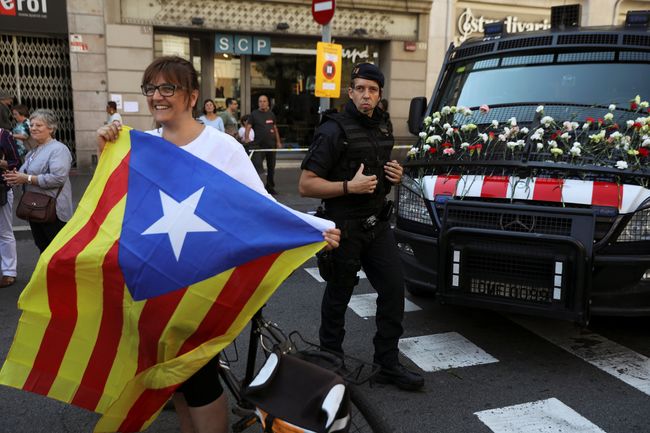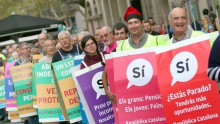At the end of last week the major cities of Catalonia, an autonomous region within the Kingdom of Spain, saw demonstrations of protest. Citizens disagreed with the tough policy of the country’s central government, which is trying to block Catalonia’s referendum on independence slated on October 1 by the regional government, the Generalitat.
Soon after the Generalitat passed laws on the referendum and the procedure of secession from Spain, they were suspended by the country’s constitutional court as violating the constitution. The Spanish government had the police raid the Generalitat offices to seize documents relating to the vote, in particular, posters and ballot papers, and arrest 14 officials. Those officials who would be involved in the preparations to the vote were fined 12,000 euro each. Moreover, Madrid appointed a new chief of the Catalan police and started sending Spanish police units to the region. On September 20 Spanish Minister of the Treasury and Public Function Cristobal Montoro took over Catalonia’s bank accounts to prevent eventual use of public money for the needs of the referendum.
Carles Puigdemont, president of the Generalitat, accused the Spanish government of having effectively suspended Catalonia’s autonomy and introduced martial law in the region. On his part, Spain’s Prime Minister Mariano Rajoy compared the Generalitat’s actions with those of dictatorships and defined the scheduled vote as a manifestation of totalitarianism.

REUTERS photo
The actions of the Spanish government enabled Catalans emphasize the violation of one of the founding principles of democracy: the people’s right to self-determination. Yet paradoxically, these democratic principles are being violated to protect the very foundations of democracy. In other words, the Spanish government does not allow Catalonia to realize its right to self-determination in order to guarantee that the constitution is respected. Under the constitution, the Kingdom of Spain (just like Ukraine) is a unitary state, where sovereignty is vested in the Spanish people as a whole. The results of a regional vote would be sent to the country’s central government agencies which, in their turn, would have to initiate a nationwide vote on amending the constitution and deciding the region’s lot. However, the Catalan government decided to do it all unilaterally, speeding up the process considerably: the law on referendum stipulates secession within 48 days in case of a positive vote by the majority of voters (while a minimum turn-out is not set).
Simultaneously with Catalonia, Scotland is trying to gain independence as well; the repeat vote on secession from the UK is slated for 2018. However, this is a horse of a different color, as the Scottish referendum has been agreed with the central government.
Catalonia is one of the 17 Spanish regions and is culturally distinct, with its own language. Its population of 7.5 million makes up 19 percent of the Spanish population. Catalonia was included into Spain after the War of the Spanish Succession of 1701-14. Since then, separatist movements have been part and parcel of its life. Early in the 20th century it succeeded in gaining independence for a few years (it was canceled after General Franco came to power in Spain and banned all things Catalan, and first of all the language). Catalonia’s autonomy was restored in 1979, and its language was granted an official status; in 2006, Catalonia gained fiscal independence.
The 2008 crisis had a powerful negative impact on Spain’s economy. This forced the central government to somewhat limit the region’s financial autonomy, which boosted separatism. By November 2012, when proponents of independence gained the majority of seats in the Catalan parliament, four referendums had been held, which did not enjoy popular support. After the Declaration of Catalonia’s Sovereignty on January 23, 2013 a vote was scheduled to take place in 2014, but it was blocked by the constitutional court just like the most recent one. Nevertheless, an unofficial referendum took place on November 9, 2014, where only 2.25 million Catalans turned out, but 80.8 percent of them supported independence. Yet the Spanish government denounced the vote and tried and convicted Artur Mas, the then president of the Generalitat.
At the moment, two views of the situation in the region prevail in Catalonia.
According to the first (official) view, Spain has always oppressed Catalonia, trying to destroy its cultural and linguistic identity and totally subordinate the region economically. It is the Catalans who “feed the entire nation,” while the Spanish government exploits them, robbing them of a large proportion of their earnings in taxes, which are later distributed among the backward regions, while Catalonia gets crumbles of its own pie.
Those who hold the second view believe that now Catalonia enjoys the greatest autonomy during its joint history as part of Spain; its culture is on the rise, its language has an official status and is supported by state, the living standards of its population are among the highest in the country.
A recent poll by the Generalitat reveals that 48.5 percent of the voters are against secession, while 44.3 percent support it. However, there is a risk that the policies of the Spanish government might have increased the numbers of secessionists.
Why does the central government take a tough stand?
Now Catalonia is one of the wealthiest and economically advanced regions of the country. It is responsible for almost 20 percent of the national GDP and 25 percent of Spain’s exports. Its capital, Barcelona, is one of the major tourist attractions in Europe. Secession would certainly debilitate Spain.
However, the situation is even more complicated: Catalonia’s lot can become a tool in the hands of global political players striving to weaken the European Union.
For one, the Catalan problem has complicated the Brexit negotiations. Earlier, the EU was able to try and use Scottish independence as leverage against the UK. Now the EU realized that, by supporting Scotland’s rapid path to independence, it will be forced to allow Catalonia to do the same. If the latter is refused, it can turn to the UK for support, and the UK might provide it in revenge for the EU’s refusal to meet its Brexit demands. Spain, aware of its own predicament, declared its willingness to support the result of the Scottish vote and simultaneously disagreed with Scotland’s joining the EU.
Supposing the Catalan government succeeds in holding the referendum and the majority of voters supports secession from Spain, the newborn country will hardly be recognized internationally. A hint can be found in the European Commission’s statement concerning “enormous respect for the constitution of Spain and the laws of this country.” The reason is that a unilateral secession procedure would be a violation of international law, and recognition would create an undesirable precedent, which can be used to legitimize illegitimate votes (first and foremost, in Crimea and Donbas) and boost separatism in other countries.
The lot of the Catalan referendum, as well as its possible impact on Spain and the EU, will be known soon.








